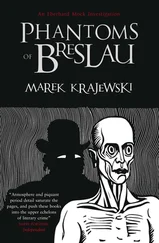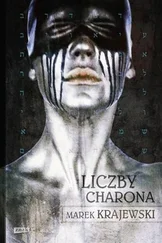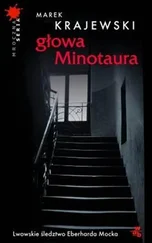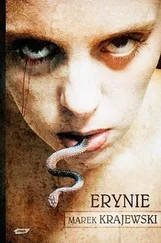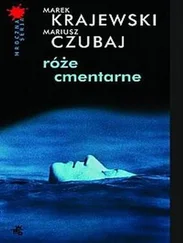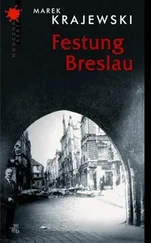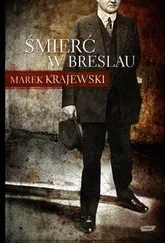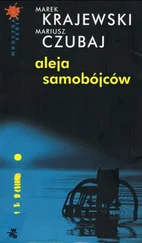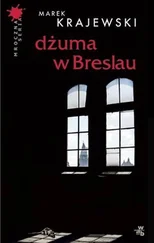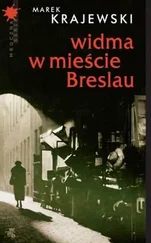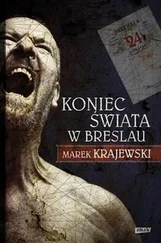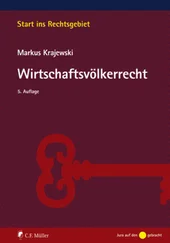Marek Krajewski - Death in Breslau
Здесь есть возможность читать онлайн «Marek Krajewski - Death in Breslau» весь текст электронной книги совершенно бесплатно (целиком полную версию без сокращений). В некоторых случаях можно слушать аудио, скачать через торрент в формате fb2 и присутствует краткое содержание. Жанр: Полицейский детектив, на английском языке. Описание произведения, (предисловие) а так же отзывы посетителей доступны на портале библиотеки ЛибКат.
- Название:Death in Breslau
- Автор:
- Жанр:
- Год:неизвестен
- ISBN:нет данных
- Рейтинг книги:3 / 5. Голосов: 1
-
Избранное:Добавить в избранное
- Отзывы:
-
Ваша оценка:
- 60
- 1
- 2
- 3
- 4
- 5
Death in Breslau: краткое содержание, описание и аннотация
Предлагаем к чтению аннотацию, описание, краткое содержание или предисловие (зависит от того, что написал сам автор книги «Death in Breslau»). Если вы не нашли необходимую информацию о книге — напишите в комментариях, мы постараемся отыскать её.
Death in Breslau — читать онлайн бесплатно полную книгу (весь текст) целиком
Ниже представлен текст книги, разбитый по страницам. Система сохранения места последней прочитанной страницы, позволяет с удобством читать онлайн бесплатно книгу «Death in Breslau», без необходимости каждый раз заново искать на чём Вы остановились. Поставьте закладку, и сможете в любой момент перейти на страницу, на которой закончили чтение.
Интервал:
Закладка:
Bank Allgemeine Deutsche Credit-Anstalt was housed in Tauentzienstrasse 14. The residential part of the building was reached from the yard. The caretaker politely allowed the new tenant’s — Doctor Maass’ — guest to pass. The policeman’s irritation, provoked by the heat, increased when he found himself in the spacious, comfortable en suite apartment rented out for Maass by the Baron. Anwaldt was accustomed to difficult conditions. He could not, however, suppress his irritation when he compared this beautiful apartment to his cockroach-infested hole with its toilet on the landing.
Maass did not even pretend to be happy at seeing his guest. He sat him behind the desk and threw down a few sheets of paper covered in regular, legible writing. He himself strode around the room drawing on his cigarette greedily as if he had not smoked for months. Anwaldt swept his eyes over the elegant desk and the luxurious objects on it (the pad of green leather, the ornamental sand-box, the fanciful, round-bellied inkstand, the brass paper-press in the shape of a woman’s leg), and found it hard to hold back the bitterness of envy. Maass paced the room, clearly excited. Thirst was drying out Anwaldt’s throat. A wasp furiously pounded between the window panes. The policeman glanced at Maass’ bulging cheeks, folded the sheets, and put them away in his wallet.
“Goodbye, doctor. I’ll examine this in my study,” he emphasized the word “my” and made to leave. Maass leapt towards him, waving his arms.
“But, my dear Herbert, you’re on edge … It is the heat … Please, do read my expert opinion here … And forgive my vanity, but I’d like to know what you think of my translation right away. Please do ask questions and give me your comments … You’re an intelligent man … I implore you …”
Maass circled around his guest, pulling out cigarettes, cigars and his hissing cigarette lighter in turn. Anwaldt thanked him for the cigar and, not caring how strong it was, inhaled several times, then began to study Friedlander’s apocalyptic outbursts. He looked cursorily through a detailed description of the method used and comments on Semitic vowels and concentrated on the translation of the prophecies. The first of them read: raam — “noise”; chavura — “wound”; makak — “to spread/melt, to fester”; arar — “ruin”; shamayim — “sky”; and the second: yeladim — “children”; akrabbim — “scorpions”; sevacha — “grille”; amotz — “white”. Further on, Maass shared his doubts: “Due to the unclear recording, the last word of the second prophecy can be understood as being either chol (10 -

) — ‘sand’ or chul (IV -

) — ‘to wriggle, dance, fall’.”
Anwaldt relaxed, the wasp flew out through the open gap in the casement window. Maass’ hypothesis was as follows: “… it seems that the person indicated by Friedlander in the first prophecy will die of a festering wound ( death, wound, to fester ), caused by the collapse of a building ( ruin ). The key to this person’s identity lies in the word ( shamayim — ‘sky’). The future victim may be somebody whose name is composed of the sounds sh, a, m, a, y, i, m , e.g. Scheim or somebody with the name Himmel, Himmler or such like.
“We believe that the second prophecy has already been fulfilled. It concerns — in our opinion — Marietta von der Malten (child, white shore — that’s the name given to the island of Malta), murdered in a saloon carriage furnished in checks (grille). In her abdominal cavity were found wriggling scorpions.”
The detective did not want to show what a great impression this expertise had made on him. He diligently stubbed out his cigar and stood up.
“Do you really have no comments?” Maass’ vanity demanded praise. He glanced stealthily at his watch. Anwaldt was reminded of an incident in the orphanage: he exhausted his tutor urging him to look at the tower of bricks built by little Herbert.
“Doctor Maass, your analysis is so precise and convincing that it’s hard to find any questions. I thank you very much,” he held out his hand in farewell. Maass seemed not to notice.
“My dear Herbert,” he squeaked sweetly. “Perhaps you’d like a cold beer?”
Anwaldt considered this for a moment (Dear Sir, please look at my tower. “I haven’t got any time …”)
“I don’t drink alcohol, but I’d love some cold lemonade or soda water.”
“Of course,” Maass brightened up. Going out to the kitchen, he glanced at his watch again. Out of professional habit, Anwaldt looked over the desk more carefully than he had the first time. (Why does he want to keep me here at all costs?) Under the paperweight, lay an open, elegant, heather-coloured envelope with a coat-of-arms printed on it. He opened it without hesitation and pulled out a hard, black card, folded in two. Inside, beautifully written in silver ink, appeared:
I cordially invite you to a masked ball this evening (i.e. Monday, July 9th) at seven. It will take place at my residence, Uferzeile 9. Ladies must dress as Eve. Gentlemen are also welcome to dress as Adam.
Wilhelm Baron von Kopperlingk.
Anwaldt noticed Maass’ shadow as the latter was leaving the kitchen. He quickly replaced the invitation under the weight. He accepted the thick, hexagonal glass with a smile, emptied it in one mighty draught and tried to understand what he had just read. Maass’ falsetto did not penetrate his swirling thoughts although the Semitist, with great animation and paying no heed to his listener’s want of concentration, was describing the scientific dispute with Professor Andreae. When he got to the point of discussing matters of grammar, the front door bell rang. Maass looked at his watch and sprang to the hall. Through the open study door, Anwaldt caught sight of a schoolgirl. (Holidays, the heat, and she’s in uniform. Apparently the idiotic rules of wearing a uniform all the year round are still in force.) They whispered for a moment, then Maass landed her a racy slap on the backside. The girl giggled. (Ah, that is why he kept me here. He wanted to demonstrate that his claim about debauched schoolgirls was not unfounded.) He could not control his curiosity and left the study. He felt his stomach suddenly cramp up and a sweetish taste gather in his mouth. Before him stood the schoolgirl Erna.
“Allow me — Assistant Anwaldt, Fraulein Elsa von Herfen, my pupil. I give the young lady private tuition in Latin,” Maass emitted ever higher tones. “Fraulein Elsa, this is Criminal Assistant Anwaldt, my good friend and colleague.”
The policeman all but fainted at the sight of the girl’s intensely green eyes.
“I think we know each other …” he whispered, leaning against the door frame.
The girl’s alto had nothing in common with Erna’s quiet, melodious voice, and the large mole on the surface of the girl’s hand nothing with Erna’s alabaster skin. He realized that he had a double in front of him.
“I’m sorry …” he sighed with relief. “You look very much like a friend of mine in Berlin. Dear Doctor, you’ve already made yourself very much at home in Breslau. You’ve been here barely four days and you’ve already acquired a pupil … And what a pupil … I won’t disturb you. Goodbye.”
Before he closed the door on Anwaldt, Maass made an obscene gesture: he joined the thumb and index finger of his left hand and slipped the index finger of his right hand in and out of the circle several times. Anwaldt snorted with contempt and ran down a few steps. Then he went upstairs and stopped above the Semitist’s apartment, on the half-landing beside a stained-glass window which ran the whole height of the building scattering coloured “dancing coins” across the stairwell. He rested his elbow on an alcove where a small copy of the Venus de Milo was concealed.
Читать дальшеИнтервал:
Закладка:
Похожие книги на «Death in Breslau»
Представляем Вашему вниманию похожие книги на «Death in Breslau» списком для выбора. Мы отобрали схожую по названию и смыслу литературу в надежде предоставить читателям больше вариантов отыскать новые, интересные, ещё непрочитанные произведения.
Обсуждение, отзывы о книге «Death in Breslau» и просто собственные мнения читателей. Оставьте ваши комментарии, напишите, что Вы думаете о произведении, его смысле или главных героях. Укажите что конкретно понравилось, а что нет, и почему Вы так считаете.

